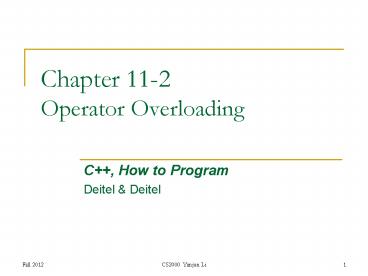Chapter 11-2 Operator Overloading - PowerPoint PPT Presentation
1 / 14
Title:
Chapter 11-2 Operator Overloading
Description:
... required for all stream-I/O operations Defines input/output classes istream ostream Defines standard stream objects cin : the standard input stream object ... – PowerPoint PPT presentation
Number of Views:44
Avg rating:3.0/5.0
Title: Chapter 11-2 Operator Overloading
1
Chapter 11-2Operator Overloading
- C, How to Program
- Deitel Deitel
2
Streams
- C I/O occurs in streams sequences of bytes
- Input
- Bytes flow from a device to main memory
- Output
- Bytes flow from main memory to a device
- I/O transfers typically take longer than
processing the data
3
Standard Streams
- C standard stream libraries
- Enables I/O operations with Unicode characters
- Unicode character set
- Represents most of the worlds commercially
viable languages, mathematical symbols and more - www.unicode.org
4
ltiostreamgt header file
- Declares basic services required for all
stream-I/O operations - Defines input/output classes
- istream
- ostream
- Defines standard stream objects
- cin the standard input stream object
- cout the standard output stream object
5
Stream operators overloading
- Stream insertion operator
- Left-shift operator (ltlt) is overloaded for stream
output - Left operand of type ostream
- Such as cout object in cout ltlt classObject
- Stream extraction operator
- Right-shift operator(gtgt) is overloaded for stream
input - Left operand of istream
- Such as cin object in cin gtgt classObject
- Already overloaded to process each built-in type
- Thus, both must be global functions
6
friend function
- Use global function with two arguments
- One argument must be class object or reference
- Often use friend function for performance reason.
- friend function of a class is defined outside
that classs scope (external function), yet has
the right to access the non-public and public
members of the class. - We declare a prototype of this external function
within the class with keyword friend.
7
operatorgtgt
- friend function (global function)
- //Complex.h
- friend istream operatorgtgt( istream , Complex
) //(real,img) - //Complex.cpp
- istream operatorgtgt(istream input, Complex
cNumber) - double real, imaginary
- input.ignore(256, '(') //ignor (
- input gtgt real //read real part
- input.ignore(256,',') //white spaces up to
next "," are ignored. - input gtgt imaginary //read imaginary part
- input.ignore(256,')') //ignore white spaces
after it. - if (input.good())
- cNumber.real real
- cNumber.imaginary imaginary
- return input // enable cin gtgt c1 gtgt c2 gtgt c3
8
Operatorltlt
- friend function (global function)
- //Complex.h
- friend ostream operatorltlt(ostream , const
Complex ) - //(real,imaginary)
- //Complex.cpp
- ostream operatorltlt(ostream output,
- const Complex
cNumber) - output ltlt "(" ltlt cNumber.real
- ltlt", ltlt cNumber.imaginary ltlt ")"
- return output //enable cout ltlt c1 ltlt c2 ltlt
c3
9
Restrictions on Operator Overloading
- Cannot change
- Precedence of operator (order of evaluation)
- Use parentheses to force order of operators
- Associativity (left-to-right or right-to-left)
- Number of operands
- e.g., is unary, can only act on one operand
- How operators act on built-in data types (i.e.,
cannot change integer addition)
10
Restrictions on Operator Overloading
- Cannot create new operators
- Operators must be overloaded explicitly
- Overloading and does not overload
- Operator ? cannot be overloaded
11
Fig. 11.1 Operators that can be overloaded.
12
Fig. 11.2 Operators that cannot be overloaded.
13
Restrictions on Operator Overloading
- At least one argument of an operator function
must be an object or reference of a user-defined
type. This prevents programmers from changing how
operators work on fundamental types.
14
Reference
- Reproduced from the Cyber Classroom for C, How
to Program, 5/e by Deitel Deitel. - Reproduced by permission of Pearson Education,
Inc.































